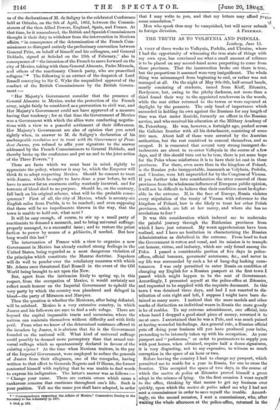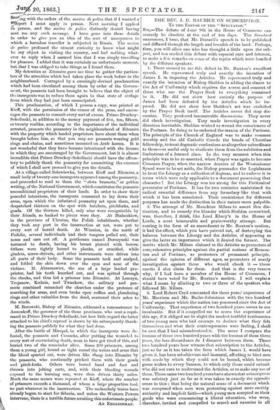THE TRUTH AS TO VOLHYNIA AND PODOLIA.
Lemberg, June 15. A VISIT of three weeks to Volhynia, Podolia, and Ukraine, where I had the opportunity of witnessing the true state of things with my own eyes, has convinced me what a small amount of reliance is to be placed on any second-hand news purporting to come from those provinces. That the insurrection broke out there is true, but the proportions it assumed were very insignificant. The whole thing was mismanaged from beginning to end, or rather was not managed at all. On the night of May 8th-9th, half-armed bands, mostly consisting of students, issued from Kieff, Zitomirz, Berdyczew, but, owing to the pitchy darkness, not more than a third found their way to the appointed rendezvous in the woods, while the rest either returned to the towns or were captured at daylight by the peasants. The only band of importance which succeeded in holding its own against the Russians for any length of time was that under Rozicki, formerly an officer in the Russian service, and who received his education at the Military Academy of St. Petersburg. He was, however, a fortnight ago, pushed across the Galician frontier with all his detachment, consisting of some 300 men. About half of these were arrested by the Austrian authorities, but the rest contrived to conceal themselves, and so escaped. It is rumoured that several very strong insurgent de- tachments are about to re-enter Volhynia in the course of a few days, and if this should turn out to be true, there is yet some hope for the Poles whose misfortune it is to have their lot cast in those provinces. For there, even more than in the kingdom of Poland, is the Russian yoke insupportable, inasmuch as Volyhnia, Podolia, and Ukraine, were left unprovided for by the Congress of Vienna. If you further take into consideration the utter removal of these provinces from the wholesome influence of European public opinion, itwill not be difficult to believe that their condition must be deplor- able in the extreme. If, in the face of Europe, Russia violates every stipulation of the treaty of Vienna with reference to the kingdom of Poland, how is she likely to treat her other Polish provinces, which are left at her mercy, and where she has no revelations to fear ?
It was this consideration which induced me to undertake the painful journey through the Ruthenian provinces from which I have just returned. My worst apprehensions have been realized, and I have no hesitation in characterizing the Russian Administration as diabolical in the extreme. From head to foot the Government is rotten and venal, and its mission is to trample out honour, virtue, and industry, which are only found among the Poles. I passed a considerable portion of five days in police- offices, official bureaux, governors' anterooms, &c., and never in my life was surrounded by such a lot of hang-dog looking coun- tenances. I was only permitted to enter Russia on condition of changing my English for a Russian passport at the first town I passed which might happen to be the seat of Government. Accordingly, I presented myself at the police-office at Zitomirz, and requested to be supplied with the requisite document. In this town I was detained three days, and had I not resorted to dis- tribution of coin right and left, I suppose I might have been de- tained as many more. I noticed that the more medals and other marks of distinction an individual wears in Russia the more greedy is he of roubles. To my extreme astonishment, one official, into whose hand I dropped a good-sized piece of money, returned it to me at once. I ascertained that he was a Pole, and was much pained at having wounded his feelings. As a general rule, a Russian official puts off doing your business till you have produced your bribe, pretending to be intensely taken up with his occupation. As your passport and " podorozna," or order to postmasters to supply you with post horses, when obtained, require half a dozen signatures, it is very disgusting, not to say expensive, to witness so much corruption in the space of an hour or two.
Before leaving the country I had to change my passport, which permitted me to reside for a year in Russia, for one to cross the frontier. This occupied the space of two days, in the course of which the maitre de police at Zitomirz proved himself a great adept in the science of lying. On the first occasion I went myself to the office, thinking by that means to get my business over quickly, upon which the maitre de police asked me why I had not sent a commissioner in order to save myself the trouble. Accord- ingly, on the second occasion, I sent a commissioner, who, after waiting the whole afternoon at the police-office, returned in the S0ut.in.:13 with the orders of the maitre de police that if I wanted a sport I must apply in person. Next morning I applied
sov--
in person, and the maitre de police distinctly denied having sent me any such message. I have gone into these details in order to give you an idea of the sort of annoyances to which a harmless traveller is subjected in Russia. The maitre de police professed the utmost curiosity to know what might be my object in visiting the country, and had nothing what- ever to reply when I assured him that I was simply travelling for pleasure. I added that it was certainly an unfortunate moment, but that I was obliged to take things as I found them.
My detention at Zitomirz gave me time to gather the particu- lars of the atrocities which had taken place the week before in the neighbourhood. Corrupted by a cunningly-devised proclamation which had been circulated among them by order of the Govern- ment, the peasants had been brought to believe that the object of the insurgents was to reduce them again to that state of serfage from which they had just been emancipated.
This proclamation, of which I possess a copy, was printed at Kieff, with the permission of the censor of the press, and encou- rages the peasants to commit every sort of excess. Prince Druckoy- Sokolinski, in addition to the money payment of five, ten, fifteen, or twenty roubles, according to the importance of the individual arrested, presents the peasantry in the neighbourhood of Zitomirz with the property which landed proprietors have about them when brought before him, so that you may see peasants wearing gold rings and chains, and sometimes mounted on Arab horses. It is not wonderful that they have became intoxicated with the licence in which they are encouraged by the Government, but it is almost incredible that Prince Druckoy-Sokolinski should have the effron- tery to publicly thank the peasantry for committing the excesses of which I shall now proceed to give you the details.
At a village called Solowiswka, between Kieff and Zitomirz, a small body of twenty-one insurgents appeared among the peasantry, and proceeded to read to them the " slota hramota," or golden writing, of the National Government, which constitutes the peasants unconditional proprietors of their lands. In order to show their peaceful intentions, the insurgents consented to lay down their arms, upon which the infuriated peasantry set upon them, and despatched thirteen on the spot with hatchets, pitchforks, and goads. Of the thirteen killed, only nine were recognizable by their friends, so hacked to pieces were they. At Bialaczkiew, in the province of Ukraine, the Polish inhabitants, whether they took any part in the insurrection or not, were put to every sort of horrid death. At Winnica, in the north of Podolia, several individuals had their tongues pulled out, their noses and ears cut off. A gentleman named Dorozynski was tortured to death, having his breast pierced with borers. Others were tightly bound to planks, or crucified, while gimlets, screw-drivers, and other instruments were driven into all parts of their body. Some the peasants took and scalped, and folded the skin down over the eyes and nose of the victims. M. Abramowicz, the son of a large landed pro- prietor, had his teeth knocked out, and was spitted through the cheeks, and thus led a prisoner into Zitomirz. At Lesczyn, Trojanow, Kodnia, and Twankow, the military and pea- sants combined ransacked the churches under the pretence of searching for arms, and even broke open coffins and, plundering rings and other valuables from the dead, scattered their ashes to the winds.
M. Borowski, Bishop of Zitomirz, addressed a remonstrance to Annenkoff, the governor of the three provinces, who sent a repri- mand to Prince Druckoy-Sokolinski, but how little regard the latter attached to his chief's reproof is shown by his subsequently thank- ing the peasants publicly for what they had done.
After the battle of Miropol, in which the insurgents were de- feated, the peasants and Cossacks, after putting the wounded to every sort of excruciating death, seem to have got tired of this, and buried two of the remainder alive. Some 200 prisoners, among them a young girl, bound so tight round the wrists and arms that the blood spurted out, were driven like sheep into Zitomirz by the peasants, who continually pricked them with their goads and pitch-forks. Others were bound band and foot and thrown into jolting carts, and, with their bleeding wounds exposed to the burning sun, were thus driven thirty miles. Much the same scenes were repeated at Kieff, where the number of prisoners exceeds a thousand, of whom a large proportion took no part whatever in the insurrection. The melancholy trains have already begun to start for Siberia, and unless the Western Powers intervene, there is a terrible future awaiting this unfortunate people.
AN ENGLISHMAN.































 Previous page
Previous page